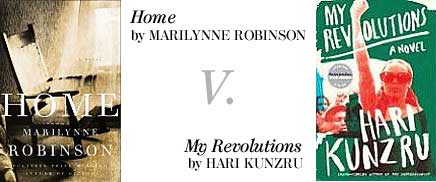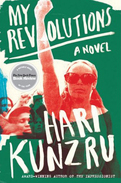
- This is Round 1, Match 8 of the JOHN UPDIKE REGIONAL
- March 18, 2009
- Next Match
- Previous Match
The Tournament of Books is an annual battle royale between 16 of the best novels published in the previous year.
A new match is played here each weekday in March.
All titles 30% off at Powells.com
The Rooster on Facebook, and on Twitter
Previous years: 2008, 2007, 2006, 2005
Contact the Tournament staff:
talk@themorningnews.org

judged by Witold Riedel
Home is set during the summer of 1957 in Gilead, a little town in Iowa, a place that has before been explored as the backdrop for Robinson’s Pulitzer Prize-winning novel by the same name.
We look at the events through the eyes of 38-year-old Glory Boughton, a former teacher who has come back to her hometown to care for her aging father, pastor Robert Boughton, a man whose needs become more basic with each passing day. Jack, Glory’s unreliable brother—a sinner, alcoholic, thief, and beloved prodigal son—soon joins them and the space around them shrinks a bit, as they are joined by the ever-present, almighty presence of a beloved God.
The novel displays elements of the biblical parable of the prodigal son, this time set in the claustrophobic environment of a house whose inhabitants seem to be more concerned with their conversations directed towards the heavens than with an information exchange with each other. The reader is left starved for explanations. It is a bit painful to watch the characters develop and also fade in an environment where so much could be solved by a few simple, yet honest conversations. There might be a little comfort in some of the repetition of actions here. I just wish that Glory cried a little less and that Jack had been in some way opened up by his apparently quite intense experiences in the world outside of Gilead. If prayer is a conversation in which one can’t expect a direct reply, Glory’s Home is wrapped in a helplessness grown from lives spent without much unsweetened dialogue between humans.
I imagine the book can feel comforting to some, especially those who understand how calming it can be to cry and pray and to make sure that those around them are not exposed to that dirty unholy truth inside. (He knows who you are.) But those who feel that their lives are enriched because they are able to share more or less genuine secrets of themselves with other human beings will find the novel very challenging, at times barely moving, and pretty frustrating to read.
My Revolutions is the story of a Brit on the brink of his 50th birthday who is forced to reflect upon his slightly violent past by a series of events that enter his present life almost like spores of mold. Michael, whose name is actually Chris, finds himself driving his wife’s BMW towards southern France, on a panicked mission to reconnect with Anna, a woman who became his saint in 1968 London, about 30 years prior. He would probably not be so determined were it not for another character from his past, Miles Bridgeman, who’s just begun to blackmail him and force him back into a political space Michael thought to have left behind (he was a member of a terrorist group in the early ‘70s).
The tempo in My Revolutions has an appealing beat. There are several stories overlapping here, and the reflective mind of a middle-aged man given a new lease on life can be quite honest, funny, and not very clean. Michael retraces the steps of his former identity in a parallel and yet chronological set of memories and conversations with people he can trust, and some others whom he should not. The reader is allowed to agree that insecurity can lead to violence and that love is not always simply a happy place. (Especially not that famous “free” kind of love.)
Anna, whom Chris imagined he loved, seems on an ever-narrowing path to martyrdom.
She begins her journey in a place of privilege, and works hard at shedding everything connected to it. Chris, for her, is a character she encounters on her journey of what seems to feel like purification. And though other characters around Chris are drawn less clearly, it’s very forgivable—it’s plausible they’d fade in the memory of a man who’s driven by hope that his love did not end up as a burned corpse in a conference room of a stormed embassy in Copenhagen.
Home is very obviously a partner book to a Pulitzer Prize-winning novel, and also a partner publication to that much Bigger Book, translated by bright minds the like of Martin Luther. The connection is very clear and it is pointed out by commentary surrounding the publication, even by this sentence here. My Revolutions is also a story of faith and homecoming; it’s just dressed up in a staccato of memories and reflections coming from the mind of a man behind the wheel. And while Home feels at times claustrophobic and contained, My Revolutions appears as if it were a room in an occupied building, most of the floor boards missing, the door kicked in, a strangely painted altar for confrontation at the other end of the room, nailed to a smelly wall, and an open door leading to other rooms for thought, none of them really comfortable—a non-protected labyrinth in which the walls are made up of false hopes and beliefs. In it Kunzru’s placed families that do not embrace but interrogate, deceptive human recorders, private saints throwing stones, monks who comfort by offering buckets for vomit. My Revolutions may seem to have a certain lightness and inexactness compared to Home, but in many ways it is a book that treats faith as a much more living, breathing, uncomfortably smelly thing, yet at times the only thing left to hold on to.
I would like to recommend both books; they seem to belong together in some ways. But I can choose only one of them, and my pick is Hari Kunzru’s My Revolutions, for its rawness, perhaps. Perhaps also because of the slightly comforting uncomfortable space it leaves for the attentive reader.
Today’s WINNER
My Revolutions by Hari Kunzru

About the Judge
From the Booth
| Like American Idol, we’re making a surprise, mid-season change to the way we present the tourney. | Kevin | John | To be honest, I’m half-regretting that we did all this reading this year because, for the first time, I have rooting interests. |
» Read Kevin Guilfoile & John Warner’s commentary on the match and leave a comment of your own «
The Standings
View the Brackets [PDF]
• Finals •
City of Refuge3 v. A Mercy1
judged by all judges + Amanda Hesser
• Round 1 •
26661 v. Steer Toward Rock4
judged by Brockman
Netherland2 v. A Partisan’s Daughter3
judged by Kate Schlegel
The White Tiger1 v. Harry, Revised4
judged by Jonah Lehrer
Unaccustomed Earth2 v. City of Refuge3
judged by Mary Roach
Shadow Country1 v. The Disreputable History of Frankie Landau-Banks4
judged by Anthony Doerr
The Lazarus Project2 v. The Northern Clemency3
judged by Monica Ali
A Mercy1 v. The Dart League King4
judged by Jonathan Eig
Home2 v. My Revolutions3
judged by Witold Riedel
• Round 2 •
26661 v. A Partisan’s Daughter3
judged by Maud Newton
Harry, Revised4 v. City of Refuge3
judged by David Rees
Shadow Country1 v. The Lazarus Project2
judged by C. Max Magee
A Mercy1 v. My Revolutions3
judged by John Hodgman
• Semifinals •
26661 v. City of Refuge3
judged by Liz Entman
Shadow Country1 v. A Mercy1
judged by Junot Díaz
• Zombie Round •
City of Refuge3 v. The Disreputable History of Frankie Landau-Banks4
judged by Rosecrans Baldwin

